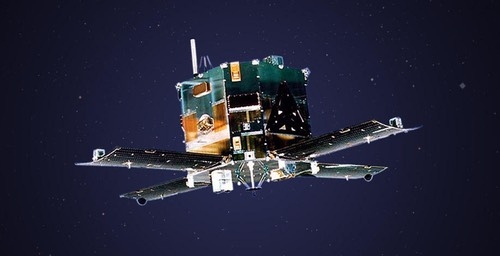The Japan Aerospace Exploration Agency (JAXA) has announced that the magnetospheric observation satellite "AKEBONO", which conducted space observations for many years and ceased operations in April 2015, re-entered the Earth's atmosphere over South America (at approximately 26.6 degrees south latitude, 54.1 degrees west longitude) during a natural descent at around 1:48pm JST on November 26, 2024.
AKEBONO was launched in February 1989 with mission goals to understand the generation mechanism of auroral electrons and physical phenomena related to aurorae. The satellite carried out mission observations with nine instruments designed to observe the aurora, electromagnetic fields, plasma waves, and plasma. AKEBONO's scientific results shed light on the acceleration mechanism of auroral electrons, including that conditions in the ionosphere can control the auroral distribution, and that this has a seasonal dependency, as well finding that the distribution of auroral electrons is predominantly biased toward the winter hemisphere. In addition, AKEBONO's observation over the 11-year solar activity cycle provided us with an opportunity to investigate the connection between solar activity and inner magnetospheric phenomena such as the Van Allen belts. The results revealed that the high-energy electron radiation in the outer Van Allen belt fluctuates significantly in response to geomagnetic activity, and that this radiation belt grows and shrinks in response to solar activity.
AKEBONO's valuable observation data collected over 26 years were the source of these many scientific results, and have contributed significantly to the solar-terrestrial sciences, as well as played an important role in enriching our lives by contributing to space weather forecasting through radiation belt observations. The scientific data acquired during the operation period have been made available to researchers worldwide through JAXA's science data archive system (DARTS) and utilized for research in solar-terrestrial sciences and space weather forecasting.
AKEBONO's operations were suspended in April 2015 due to decreased observation opportunities resulting from a drop in apogee altitude and secular degradation of the satellite system and mission instruments. Since then, the satellite has gradually lost altitude due to the Earth's atmospheric drag and other factors, and today, we confirmed that the satellite re-entered the atmosphere on November 26, 2024.
Throughout its long operational life, AKEBONO played an important role in opening up new horizons in solar-terrestrial sciences. The scientific questions raised by AKEBONO's achievements have been carried over to JAXA's REIMEI and ARASE (ERG) missions and are continuing to develop further. We would like to express our sincere appreciation to all those involved in the development and operation of these satellites.


